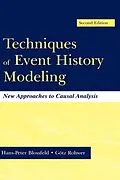The book is for social scientists interested in causal analysis. This can include psychologists, economists, sociologists, education academics.
Autorentext
G"tz Rohwer, Hans-Peter Blossfeld
Zusammenfassung
Including new developments and publications which have appeared since the publication of the first edition in 1995, this second edition: *gives a comprehensive introductory account of event history modeling techniques and their use in applied research in economics and the social sciences; *demonstrates that event history modeling is a major step forward in causal analysis. To do so the authors show that event history models employ the time-path of changes in states and relate changes in causal variables in the past to changes in discrete outcomes in the future; and *introduces the reader to the computer program Transition Data Analysis (TDA). This software estimates the sort of models most frequently used with longitudinal data, in particular, discrete-time and continuous-time event history data.Techniques of Event History Modeling can serve as a student textbook in the fields of statistics, economics, the social sciences, psychology, and the political sciences. It can also be used as a reference for scientists in all fields of research.
Inhalt
Contents: Preface. Introduction. Event History Data Structures. Nonparametric Descriptive Methods. Exponential Transition Rate Models. Piecewise Constant Exponential Models. Exponential Models With Time-Dependent Covariates. Parametric Models of Time-Dependence. Methods to Check Parametric Assumptions. Semi-Parametric Transition Rate Models. Problems of Model Specification. Appendix: Basic Information About TDA.
Titel
Techniques of Event History Modeling
Untertitel
New Approaches to Casual Analysis, Second Edition
EAN
9781135639129
ISBN
978-1-135-63912-9
Format
E-Book (pdf)
Hersteller
Herausgeber
Genre
Veröffentlichung
01.09.2001
Digitaler Kopierschutz
Adobe-DRM
Dateigrösse
14.29 MB
Anzahl Seiten
320
Jahr
2001
Untertitel
Englisch
Unerwartete Verzögerung
Ups, ein Fehler ist aufgetreten. Bitte versuchen Sie es später noch einmal.
